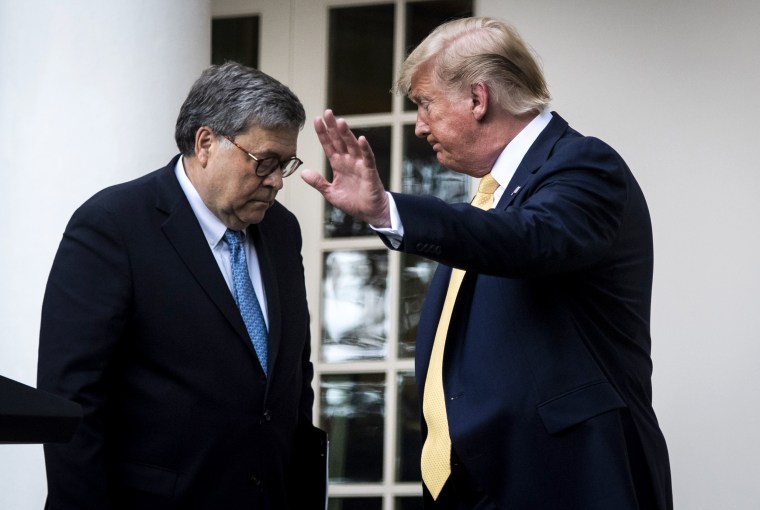Throughout Donald Trump's presidency, the rule of law has struggled through some challenging weeks, but the last five days have been especially rough. After federal prosecutors filed a routine sentencing recommendation in the case of Republican operative Roger Stone, the felon's longtime associate, Donald Trump, denounced the filing in a tweet.
Immediately thereafter, Attorney General Bill Barr's Justice Department intervened in the case, rejected its own prosecutors' sentencing recommendation, and demanded a far more lenient punishment for the president's friend. Four prosecutors resigned in protest, and federal law enforcement confronted a highly unusual crisis in which the line blurred between Trump's political interests and the Justice Department's agenda.
Even some of the White House's Republican allies found it a difficult dynamic to defend.
It was against this backdrop that the attorney general himself spoke out yesterday with comments that appeared to be a rebuke of the president, saying Trump's tweets about his department make Barr's job vastly more difficult.
"Public statements and tweets made about the department, about people in the department, our men and women here, about cases pending in the department and about judges before whom we have cases make it impossible for me to do my job and to assure the courts and the department that we're doing our work with integrity," Barr said.
Barr went on to claim that he and his team had already decided to intervene in the Stone case before the presidential tweet, which created a political mess when Trump publicly aired his demands.
"Do you go forward with what you think is the right decision, or do you pull back because of the tweet? And that just sort of illustrates how disruptive these tweets can be," Barr said, adding that Trump's online commentary "undercuts" him.
Senate Majority Leader Mitch McConnell (R-Ky.), after days of silence on the controversy, quickly endorsed the attorney general's comments, apparently hoping -- once again -- that Trump would scale back his misguided social-media habits.
For some observers, Barr's interview was seen as a landmark rebuke of an out-of-control president. Trump is under the mistaken impression that the Justice Department exists as an extension of his political agenda, the argument goes, and the attorney general sat down with ABC News in order to distance himself from the president's radical antics, establish some independence, and let Trump know it's time to back off.
Let's call this the credulous interpretation of yesterday's developments.
On the flipside, there's also the incredulous interpretation, which suggests Barr's apparent rebuke wasn't a sincere effort to restore propriety to the federal justice system, but rather, was the attorney general's way of telling the White House that Trump is making it more difficult for Barr to corrupt the federal justice system.
Even stripped of all context, taking the attorney general's words at face value is difficult given his strained credibility and unfortunate track record of saying things that tend to fall apart under scrutiny.
But the closer one looks, the more difficult it is to take the attorney general's apparent concerns seriously. Barr said yesterday that he's finding it difficult to do his "job," which necessarily raises the question of exactly what he considers his job to be. Because if the attorney general believes he has a responsibility to use the levers of power to advance Trump's political interests, the president's tweets are only inconvenient insofar as they help expose possible corruption at Main Justice.
Barr appears to have intervened in multiple cases in order to help the president and his associates. The more Trump brags about this, the bigger the controversy, and the harder it is for the attorney general to keep helping the president and his associates.
By this reasoning, Barr wants Trump to stop tweeting about the Justice Department and ongoing criminal proceedings because he prefers less scrutiny of his misuse of federal law enforcement. The attorney general wants his actions to unfold in the shadows, and the tweets make the entire scheme obvious.
For Barr, Trump's tweets are not themselves the problem. It's the effects of the tweets that are the problem.
As Asha Rangappa, a lawyer and former FBI special agent, put it yesterday, "It definitely makes it harder to crime for the President when the President keeps making it obvious that you are criming for him."

